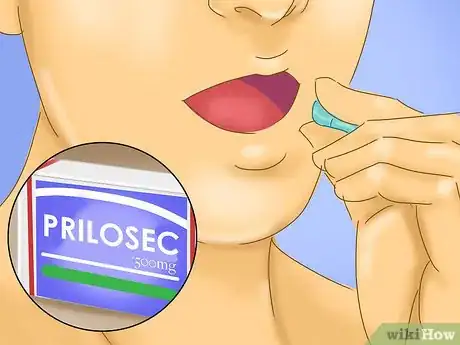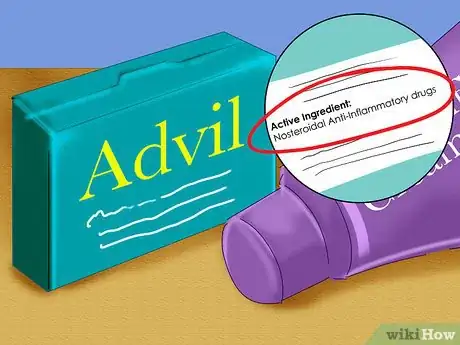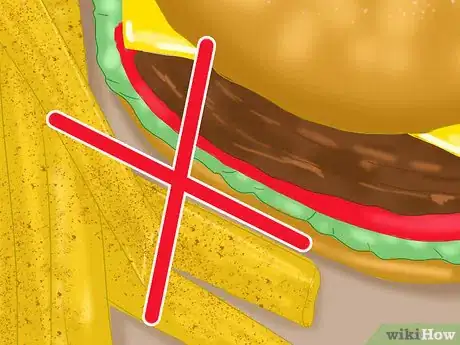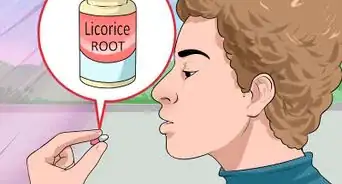This article was co-authored by Laura Marusinec, MD. Dr. Marusinec is a board certified Pediatrician at the Children's Hospital of Wisconsin, where she is on the Clinical Practice Council. She received her M.D. from the Medical College of Wisconsin School of Medicine in 1995 and completed her residency at the Medical College of Wisconsin in Pediatrics in 1998. She is a member of the American Medical Writers Association and the Society for Pediatric Urgent Care.
wikiHow marks an article as reader-approved once it receives enough positive feedback. In this case, 88% of readers who voted found the article helpful, earning it our reader-approved status.
This article has been viewed 311,971 times.
A peptic ulcer develops when the stomach lining or the first part of the small intestine begins eroding. Symptoms include a gnawing or burning pain in the abdomen between the breastbone and the navel, belching, nausea, vomiting, poor appetite, loss of weight, and feeling tired and weak.[1] If you are diagnosed with a peptic ulcer, your medical provider may prescribe antacids, acid blockers or antibiotics to reduce the pain and heal the ulcer. In addition to following your doctor's treatment plan, there are several things you can do to avoid irritating your ulcer and prevent future flare-ups.
Steps
Taking the Right Medication
-
1Take all prescribed medication. If your health care provider has determined your peptic ulcer was caused by Helicobacter pylori (H. pylori), antibiotics are necessary to eradicate the bacteria. H. pylori is a bacteria that weakens the stomach's protective coating, enabling damage to the sensitive layers below. If you have H. pylori you will probably be prescribed what is known as "Triple Therapy." This involves taking three kinds of medication for a certain time.
- You will need to take two antibiotics, as well as a proton pump inhibitor. The inhibitor will work to reduce acid production.
-
2Avoid nonsteroidal anti-inflammatory drugs (NSAIDs). Some NSAIDs can exacerbate your ulcer and cause pain and irritation. Common drugs such as aspirin and ibuprofen can make the stomach more vulnerable to acid and pepsin. These drugs are frequently found in nonprescription medications that you might take to treat a headache or muscle pain. Keep this in mind, check the ingredients and speak with your doctor about whether or not you can take NSAIDs.[2]Advertisement
-
3Be wary of antacids. Many antacids are available over the counter which can relieve irritation and pain of heartburn and indigestion. While they might ease discomfort, they will not treat or cure an ulcer. If you want to take antacids be sure to speak to your doctor about it first as they can block the absorption of your prescribed medication, and consequently lower its effectiveness.
- In general doctors suggest taking antacids at least an hour before, or two hours after, you take your prescribed medication.
- Easily accessible antacids include magnesium hydroxide, aluminum hydroxide, calcium carbonate, and sodium bicarbonate.
Eating Well
-
1Avoid food that increases the production of stomach acid. The foods which may irritate ulcers vary from person to person. Some people can eat whatever they like without any increased irritation, but this is not true for everyone. You will have to learn over time which foods cause you problems and cut them out or limit them in your diet. This also helps to prevent ulcers in the future. A good place to start is with foods that increase your stomach acid production.[3]
- Patients with peptic ulcers should avoid diets rich in red meat, fried or fatty foods, and refined foods, such as flour or sugar.
- Be cautious of dairy foods with whole milk or cream.
- Spearmint, peppermint, and other minty foods seem to increase the production of stomach acid.
- Diets heavy in these foods can lead to further ulcer irritation and an increase in stomach acid.
-
2Steer clear of food that may irritate your ulcer. As well as foods that can provoke increased production of stomach acid, some other foods can irritate your ulcer more directly. In practice, this will vary from person to person, but there are some general recommendations for those with an ulcer. The first of these is to try to avoid eating spicy food. The sting you feel from spicy food if you have a cut on your finger or mouth can be replicated in your stomach or intestine if you have an ulcer.
- The second recommendation is to avoid citrus and acidic foods and drinks. Highly acidic orange or lemon juice could irritate the ulcer and cause you pain.
- You should also be wary of tomato products, onions and garlic, and heavily seasoned food in general.[4]
-
3Eat plenty of fiber. Diets rich in whole grains and fiber-rich foods, with limited dairy, help control the production of stomach acid. Ensure you get plenty of fibrous vegetables as part of your healthy balanced diet. If you are not consuming enough vitamin-rich foods your body may find it harder to heal your ulcer.[5]
- Good sources of fiber are whole-wheat bread, pasta, and brown rice.
- Opt for limited amounts of lean meat, and limited low-fat dairy products.[6]
- There is no single recommended diet for those with an ulcer, so you should think about what food causes you irritation and discuss this with your doctor.[7]
- Eating foods rich in antioxidants (blueberries, cherries, tomatoes, squash, and bell peppers), flavonoids (apples, celery, cranberries, onions, garlic, and tea), B vitamins, and calcium (almonds, beans, whole grains, spinach, kale, and sea vegetables) may also help to reduce your symptoms.
- Continue to drink 6-8 glasses of water each day as part of your healthy diet.
-
4Eat meals according to a regular schedule. A peptic ulcer sufferer is not advised to eat sporadic meals that vary in size. Doing so may disrupt the normal production of stomach acid, and end up irritating an ulcer. Keeping meals small and regular can help level out stomach acid. Your stomach may deal better with small regular meals than large irregular ones.
- Avoid eating anything at least two hours before you go to bed.[8]
Knowing Other Things to Avoid
-
1Reduce consumption of alcohol. Heavy consumption of alcohol is a risk factor in the development of peptic ulcers.[9] If you have been diagnosed with an ulcer, continued consumption of alcohol can contribute to irritation of ulcers and you should avoid it if you have an ulcer. This is especially true for strong alcohol and liquors.[10]
- Alcohol can also lead gastritis, an inflammation of the stomach, that can severely impact the amount of time it will take for an ulcer to heal.
-
2Cut down on caffeine. Much like certain foods, caffeine can contribute to an increase in the secretion of stomach acid, which in turn increases the likelihood of your ulcer becoming irritated. Many stimulants have this effect and are best avoided when you have an ulcer. Caffeine is found in a wide variety of drinks such as coffee, tea, energy drinks, and soda, so be sure to check the label if you're uncertain.[11]
- It is thought that even decaffeinated coffee can increase stomach acid production. So it may be best to avoid even decaffeinated coffee.
-
3Avoid nicotine. Quit smoking and avoid second-hand smoke. The chemicals in cigarette smoke can weaken the stomach lining, which irritates current ulcers or may even cause new ulcers to develop. Similar to other stimulants, nicotine may contribute to an increase in the production of stomach acid, which can irritate an ulcer. Nicotine can also lead to inflammation which hampers the healing process.
-
4Reduce stress. Although there is an uncertain correlation between stress and ulcer pain, some ulcer sufferers find that when emotional stress in their life rises, so does the ulcer irritation. A program that reduces stress may have beneficial consequences and help you avoid irritating your ulcer. Try regularly practicing relaxation techniques such as yoga, meditation or tai chi.
- Some research suggests that a formal stress reduction program with a class might be more effective for those with an ulcer than doing it at home alone.
Warnings
- Call your doctor immediately if you experience a sudden increase in abdominal pain or sharpness in the quality of the pain, vomiting blood or material that looks like coffee grounds, or blood in your stool or black, tarry stools.⧼thumbs_response⧽
References
- ↑ http://www.hopkinsmedicine.org/healthlibrary/conditions/digestive_disorders/stomach_and_duodenal_ulcers_peptic_ulcers_85,P00394/
- ↑ http://www.hopkinsmedicine.org/healthlibrary/conditions/digestive_disorders/stomach_and_duodenal_ulcers_peptic_ulcers_85,P00394/
- ↑ https://www.drugs.com/cg/diet-for-stomach-ulcers-and-gastritis.html
- ↑ https://www.drugs.com/cg/diet-for-stomach-ulcers-and-gastritis.html
- ↑ https://www.mayoclinic.org/diseases-conditions/peptic-ulcer/diagnosis-treatment/drc-20354229
- ↑ https://www.drugs.com/cg/diet-for-stomach-ulcers-and-gastritis.html
- ↑ http://www.hopkinsmedicine.org/healthlibrary/conditions/digestive_disorders/stomach_and_duodenal_ulcers_peptic_ulcers_85,P00394/
- ↑ https://www.drugs.com/cg/diet-for-stomach-ulcers-and-gastritis.html
- ↑ https://www.pennmedicine.org/for-patients-and-visitors/patient-information/conditions-treated-a-to-z/peptic-ulcer-disease
About This Article
To avoid irritating an ulcer, try to avoid acidic foods like citrus and anything spicy, since they can make an ulcer feel worse. Additionally, you should stay away from foods containing dairy or high amounts of sugar that increase the production of stomach acid since this can lead to further irritation. To control the production of stomach acid, consume foods rich in whole grains and fibre, like whole-wheat bread, pasta, and brown rice. If you typically eat large meals randomly throughout the day, try switching to small, regular ones to help level out your stomach acid. For more advice from our Medical co-author, including how to avoid irritating your ulcer by reducing stress, keep reading!






































































Medical Disclaimer
The content of this article is not intended to be a substitute for professional medical advice, examination, diagnosis, or treatment. You should always contact your doctor or other qualified healthcare professional before starting, changing, or stopping any kind of health treatment.
Read More...